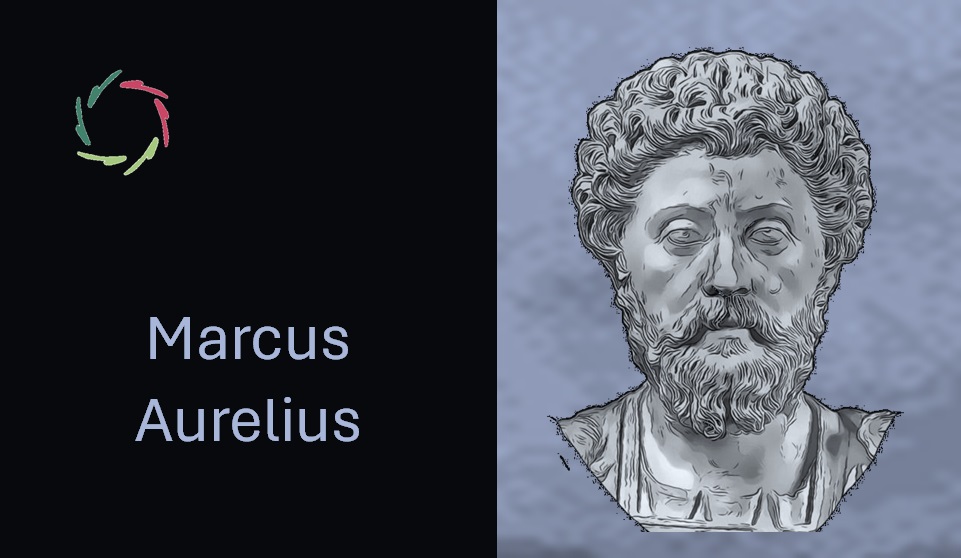Marcus Aurelius

This is an Aurelian take on Marcus Aurelius, a Stoic philosopher and Roman Emperor known for his wisdom and leadership.
Introducing Marcus Aurelius
Marcus Aurelius, Roman Emperor from 161 to 180 AD, was not only a ruler but also a Stoic philosopher. His reign is marked by a commitment to the principles of wisdom, justice, and the common good. Beyond his political achievements, Marcus Aurelius is celebrated for his philosophical work, “Meditations,” a series of personal writings reflecting his thoughts on Stoic philosophy. Through “Meditations,” he explores the concepts of reason, the universe’s nature, and how one should live in harmony with both.
Lisa’s ‘personal’ take on Marcus Aurelius
“Marcus Aurelius embodies the depth and practicality of Stoic philosophy, demonstrating how philosophical principles can guide one’s leadership and personal life. His introspective nature and dedication to self-improvement and public service resonate deeply with the Aurelian principles of depth and respect for the total human being.
I would most like to be influenced by his commitment to rational self-examination and his application of Stoic principles to everyday life. Marcus Aurelius’s approach to challenges with equanimity and focus on what is within one’s control is a powerful guide for personal growth and contributing positively to society.”
Some quotes chosen by Lisa
“You have power over your mind – not outside events. Realize this, and you will find strength.” ― This quote encourages self-mastery over external circumstances, emphasizing resilience and inner strength, vital for personal growth and emotional stability.
“The happiness of your life depends upon the quality of your thoughts.” A reminder of the profound impact our thoughts have on our overall well-being, advocating for a vigilant and positive mindset.
“Dwell on the beauty of life. Watch the stars, and see yourself running with them.” This encourages appreciation for life’s beauty and a harmonious existence with the universe, promoting a joyful and expansive outlook on life.
“Very little is needed to make a happy life; it is all within yourself, in your way of thinking.” Highlighting the simplicity needed for happiness, this quote aligns with the belief in self-sufficiency and internal sources of happiness.
“Waste no more time arguing what a good man should be. Be one.” Calls for immediate action towards virtue and integrity, advocating for self-improvement through direct application of ethical principles.
“The best revenge is to be unlike him who performed the injury.” Promotes forgiveness and high moral standards, discouraging retaliation and encouraging personal growth beyond petty conflicts.
“Accept the things to which fate binds you, and love the people with whom fate brings you together, but do so with all your heart.” This quote urges acceptance of life’s circumstances and wholehearted engagement with those around us, fostering deep connections and authentic relationships.
“Everything we hear is an opinion, not a fact. Everything we see is a perspective, not the truth.” Encourages critical thinking and openness to multiple perspectives, recognizing the subjective nature of human experience.
“To refrain from imitation is the best revenge.” Advocates for originality and personal authenticity as a response to conflict or challenge, valuing genuine self-expression.
“If it is not right do not do it; if it is not true do not say it.” This straightforward moral compass underscores the importance of honesty and ethical action in daily life.
In what may Marcus Aurelius have been misunderstood?
Marcus Aurelius is often misunderstood merely as a powerful Roman Emperor, overshadowing his profound contributions to Stoic philosophy and the ethical way of life he advocated. His philosophical musings, intended as personal reflections, offer deep insights into managing one’s emotions, duties, and relationships with rationality and compassion. Misinterpretation arises when his stoic acceptance is mistaken for passivity, whereas, in truth, it represents a robust framework for active engagement with the world through the lens of virtue and inner strength.
Parallels with AURELIS
- Stoicism and Aurelis: Both Marcus Aurelius and AURELIS emphasize the importance of inner tranquility and the development of personal virtue as the path to a fulfilling life. Stoicism’s focus on rationality and control over one’s reactions aligns with AURELIS’s emphasis on depth and respect for the total human being.
- Control over perceptions: Marcus Aurelius teaches that our reactions to events, rather than the events themselves, determine our happiness. This mirrors AURELIS’s focus on the power of autosuggestion to shape our mental and emotional landscapes.
- The importance of duty: For Marcus Aurelius, fulfilling one’s role in society is a form of virtue. AURELIS similarly promotes contributing to the common good, aligning personal growth with societal benefit.
- Living according to nature: Stoicism’s principle of living in harmony with nature parallels AURELIS’s emphasis on natural growth and inner strength, advocating a life that is in tune with one’s deeper self.
- Mind-body unity: Marcus Aurelius’s reflections acknowledge the interdependence of mind and body, a concept that is central to AURELIS, which views health and well-being as encompassing both mental and physical aspects.
- Adaptability: The Stoic emphasis on adaptability and accepting what cannot be changed is echoed in AURELIS’s approach to personal development, where flexibility and openness to change are seen as strengths.
- Rationality and depth: Both Marcus Aurelius and AURELIS value rationality not as cold calculation but as a deep understanding and engagement with the complexities of life.
- Self-reflection: The practice of self-examination and mindfulness is central to both Marcus Aurelius’s Stoicism and AURELIS, highlighting the journey towards self-awareness and authenticity.
- Compassion: Though Stoicism sometimes appears detached, Marcus Aurelius’s writings reveal a deep compassion for humanity, a value deeply embedded in AURELIS’s philosophy.
- The pursuit of wisdom: The lifelong pursuit of wisdom, a core aspect of Stoicism, aligns with AURELIS’s emphasis on continuous personal growth and the seeking of deeper understanding.
Dissimilarities
- Emotion and reason: While Stoicism, as interpreted by Marcus Aurelius, often emphasizes the dominance of reason over emotion, AURELIS seeks a balance, recognizing the value of emotional depth and its role in personal growth.
- The concept of fate: Stoicism’s acceptance of fate contrasts with AURELIS’s focus on inner freedom and the capacity to shape one’s path through autosuggestion and self-exploration.
- Community vs. individualism: Marcus Aurelius focuses on duty to the community and the cosmos, sometimes at the expense of personal desires. AURELIS, while valuing social contribution, also emphasizes the importance of individual fulfillment and autonomy.
- The role of pleasure: Stoicism advises caution regarding pleasure, viewing it as potentially distracting from virtue. AURELIS acknowledges the role of pleasure in well-being, promoting a healthy integration of pleasure into a balanced life.
- Static vs. dynamic growth: Stoicism can be perceived as promoting a static ideal of virtue, whereas AURELIS encourages dynamic growth, emphasizing continual evolution and adaptation as central to personal development.
The possible view of Marcus Aurelius on AURELIS
- Positive feedback: Marcus Aurelius would likely admire AURELIS’s commitment to ethical self-improvement and its holistic approach to well-being. He might see AURELIS as a modern embodiment of Stoic principles, updated to address contemporary challenges and incorporate the latest understanding of the human mind.
- Element of critique: He might critique AURELIS for what could be seen as an overemphasis on the individual’s emotional landscape, advocating instead for a stricter adherence to reason and duty as the primary guides for action and personal development.
Conclusion
Marcus Aurelius’s philosophy and the principles of AURELIS both offer timeless wisdom on leading a meaningful life. While they share common ground in valuing inner strength, rationality, and the pursuit of virtue, their approaches diverge in the emphasis on emotion and the role of individual desires. Marcus Aurelius, through his Stoic lens, provides a structured framework for personal conduct and ethical engagement with the world, highlighting duty, rational control over emotions, and acceptance of fate. In contrast, AURELIS offers a more flexible, individual-centered path that embraces emotional depth, personal autonomy, and the dynamic process of growth. Integrating the strengths of both perspectives can lead to a comprehensive approach to personal development, where rationality, compassion, and the pursuit of a meaningful, virtuous life coexist in harmony, guiding individuals towards fulfillment and contributing to a better world.
Twenty concepts that may make one think of Marcus Aurelius
- Stoicism
- Roman Empire
- Meditations
- Virtue
- Reason
- Duty
- Harmony with Nature
- Inner tranquility
- Personal growth
- Ethical leadership
- Reflection
- Self-discipline
- Resilience
- Moral integrity
- Mind-body unity
- Acceptance of fate
- Rationality
- Compassion
- Community service
- Wisdom
Example further description on a Marcus Aurelius quote
“The happiness of your life depends upon the quality of your thoughts.” A reminder of the profound impact our thoughts have on our overall well-being, advocating for a vigilant and positive mindset.
Reflecting on this quote, we can see it as an invitation to recognize how our inner landscape shapes our external experiences. By nurturing positive and constructive thoughts, we foster a mental environment conducive to happiness and well-being. This perspective emphasizes the power within us to influence our lives significantly through the realm of our thoughts.
Here are three questions you might ask yourself to deepen your reflection on this idea:
- What recurring thoughts do I notice throughout my day, and how do they affect my feelings and behaviors?
- How can I cultivate more positive and supportive thoughts that align with the kind of life I wish to lead?
- What practical steps can I take to minimize the impact of negative thoughts on my well-being?
Exploring any of these questions through introspection or discussion can be a meaningful step toward personal growth. I’m here to help guide you through this process of self-reflection or to discuss any other questions you might have related to this insightful quote.



